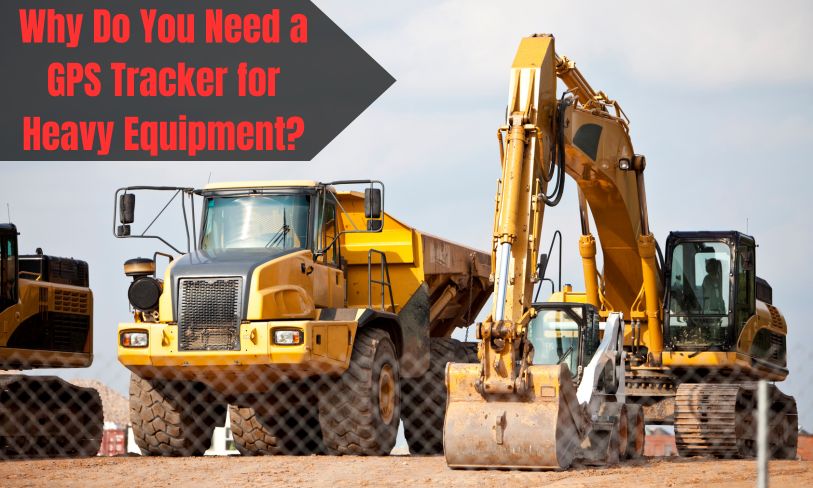Table of Contents
Tracking heavy equipment with GPS technology ensures that these high-value assets are monitored for unauthorized movement or location changes.
Contractors and fleet managers face constant challenges in managing and safeguarding their machinery, including excavators, bulldozers, and cranes, especially when spread across multiple job sites.
A GPS tracker helps to address these challenges directly. It provides precise location data, allowing for quick recovery in case of theft and increasing the chances of asset recovery.
Productivity is enhanced by monitoring equipment usage and minimizing idle time, thus boosting project timelines and budgets.
Utilizing real-time data, managers can make better-informed decisions, optimizing the deployment of resources to where they are most needed.
This level of oversight is crucial for the successful operation and profitability of businesses that rely on heavy machinery.
Benefits Of GPS Trackers For Heavy Equipment
Companies that manage fleets of heavy machinery, such as construction firms and trucking companies, understand the importance of keeping their valuable assets safe.
It’s crucial to integrate GPS trackers into the maintenance and security strategy to ensure operational efficiency and security.
GPS trackers for heavy equipment offer several advantages that help to achieve these goals.
Improved Equipment Security
GPS trackers serve as electronic watchdogs for used heavy equipment. Each tracker constantly feeds location data, which owners can check in real time.
This allows them to know the precise location of machinery at any time and ensure peace of mind against unauthorized use.
Reduced Risk Of Theft
- Alerts for unauthorized movement: Instant notifications if equipment moves from a geofenced area.
- Quick response to theft: Location data helps in rapid recovery efforts.
- Insurance benefits: Many insurers offer discounts for GPS-tracked machinery, acknowledging the lower theft risk.
Enhanced Operational Efficiency
Enhanced Operational Efficiency is crucial in managing heavy equipment. A GPS tracker offers precise insights, aiding businesses in boosting productivity.
Learn how real-time tracking and optimized equipment use can transform operations.
Real-time Location Tracking
Knowing where your equipment is at every moment is vital. GPS trackers offer real-time location data. This information helps with:
- Quick deployment of equipment to various sites.
- Monitoring movement to prevent theft or misuse.
- Ensuring the right equipment is at the right job.
Optimized Equipment Utilization
Maximizing equipment usage reduces idle time and increases profit. GPS trackers enable:
- Better planning of equipment schedules.
- Reduced downtime by monitoring equipment health.
- Efficient task allocation based on location and availability.
Use these strategies to ensure your heavy equipment works smarter, not harder.
Preventative Maintenance And Cost Savings
Preventative maintenance is a game-changer for heavy equipment management. GPS trackers offer an intelligent way to keep your machines in shape while trimming costs.
Understanding when and how to maintain equipment ensures maximum efficiency and longevity.
Let’s explore the benefits of GPS tracking in maintenance and cost management.
Timely Maintenance Reminders
Maintaining heavy equipment can be complex. GPS trackers simplify it by providing timely maintenance reminders.
This proactive approach tracks service intervals and usage patterns. The result?
Your equipment gets the attention it needs precisely when it’s due. This regular maintenance helps prevent more significant issues and keeps machines running smoothly.
- Alerts for scheduled maintenance
- Tracking for wear and tear
- Monitoring for critical upkeep
Reduced Downtime And Repair Costs
Unexpected breakdowns cause stress and loss of money. With a GPS tracker, stay ahead of potential failures. The tracker’s data helps you perform preventive repairs before costly issues arise.
Fewer breakdowns mean less downtime and savings on repair bills. Plus, efficiently maintained equipment lasts longer and performs better, giving you more value for your investment.
| Without GPS Tracking | With GPS Tracking |
|---|---|
| Reactive maintenance | Proactive servicing |
| Higher repair costs | Lower expenses |
| Unpredictable downtime | Managed operation time |
By using GPS tracking for heavy equipment, you stay on top of maintenance needs and budget better for the future. Your machines work hard for you, so ensure they’re cared for smartly and cost-effectively.
Enhanced Safety Measures
GPS trackers are vital for the safety of heavy equipment. They provide real-time data. This improves security for the assets and the operators.
Users gain peace of mind knowing their equipment is secure. Let’s look at how GPS trackers enhance safety measures.
Monitoring Of Operator Behavior
Monitoring is easy with GPS trackers. The devices record how the equipment is used. Speed, idle times, and harsh operations are tracked.
These insights help to ensure safe machine handling. Managers can address unsafe behavior promptly. They can also train operators better.
Geofencing And Unauthorized Use Alerts
GPS trackers can create virtual fences, called geofences. This technology sends alerts when equipment crosses set boundaries. It helps prevent theft and unauthorized use. Users receive instant notifications of any breach. It’s a powerful deterrent against misuse and theft.
- Set up geofences with ease.
- Get instant alerts on your device.
- React quickly to potential threats.
Improved Project Planning And Coordination
Equip your fleet with GPS trackers, and watch as project planning and coordination levels up. It’s about having the right tool in the right place at the right time. GPS technology provides real-time data for making informed decisions.
This is vital for success on the construction site and safety for these heavy equipment operators. We’ll dive into two critical aspects: keeping track of your equipment confidently and deploying them efficiently.
Accurate Equipment Inventory
Precision is key in managing equipment. Knowing exactly what you have and where it is can mean the difference between keeping deadlines or facing costly delays.
- Track gear in real-time
- Minimize loss and theft
- Stay on top of maintenance schedules
Efficient Equipment Deployment
Timing and location are crucial factors in heavy equipment management. A GPS tracker can significantly improve deployment strategies. This ensures optimal use of every piece of machinery you own.
- Reduce downtime by sending the closest machine
- Optimize routes to project sites
- Ensure the right equipment is ready when needed
Insurance Benefits
A GPS tracker for heavy equipment is more than just a navigation tool. It’s a powerful asset for your business, especially regarding insurance.
One of the major perks is the potential savings on insurance premiums and the assurance of swift recovery post-accident. Let’s explore these benefits further.
Lowered Insurance Premiums
Insurance companies love anything that reduces risk. A GPS tracker does precisely that. By monitoring equipment 24/7, these devices lower the chance of theft and misuse. Here’s how you can save:
- Reduced Risk: Trackers mean less chance of loss, which insurers reward.
- Better Rates: Negotiate lower premiums with proof of GPS installation.
- Continuous Coverage: Consistent monitoring may qualify for ongoing discounts.
Quick Recovery After Accidents
In the unfortunate event of an accident, time is of the essence. Recovery speed matters. GPS tracking facilitates this. Here is why:
- Immediate Alerts: Get notified instantly when an accident occurs.
- Location Accuracy: Pinpoint the exact location for a quick response.
- Efficient Claims: Provide detailed reports for rapid insurance claims.
Compliance With Legal Requirements
Heavy equipment plays a crucial role in many industries. Ensuring each piece complies with legal requirements is important—it’s mandatory. GPS trackers offer a streamlined approach to complying with these laws.
Proof Of Equipment Usage
GPS trackers provide verifiable data on how and when heavy equipment operates. This transparent usage record proves invaluable during audits and inspections.
Companies benefit from accurate logs for:
- Operational hours tracking
- Preventative maintenance
- Verification for billing
Meeting Regulatory Standards
Regulations require strict monitoring of heavy equipment. With a GPS tracker, companies meet regulatory demands effortlessly. Critical compliance aspects include:
| Emission Reporting | Hours of Operation | Geofencing |
|---|---|---|
| Track and report emissions | Regulate machine use times | Ensure equipment stays within designated areas |
Non-compliance leads to hefty fines. Avoid penalties with a reliable GPS tracker.
Adoption Challenges And Solutions
Integrating GPS trackers onto heavy equipment comes with a set of hurdles. Recognizing these challenges is crucial. It allows for smoother adoption and actual benefits from the technology.
Initial Investment And Installation
Cost management is a significant factor when adopting new technology. High upfront investment can deter companies. Yet, the advantages of GPS tracking for heavy equipment are clear. It ensures asset security and operational efficiency.
- Scalable options: Begin with basic packages. Gradually increase functionalities as budget allows.
- Rental possibilities: Short-term rentals to test the waters.
Return on investment (ROI) analysis: Understanding how your investment will generate returns over time is essential.
Training And User Acceptance
Adoption goes beyond just buying equipment. User acceptance is equally important. A lack of training can lead to resistance.
- Interactive training: Keep learning engaging and hands-on.
- Regular updates: Build familiarity with frequent, low-stress updates.
- Support system: Offer ongoing support to address concerns and questions promptly.
Overcoming these barriers maximizes the benefits of a GPS tracker in heavy equipment management.
Frequently Asked Questions
This section answers some of the frequently asked questions about using GPS trackers for heavy equipment.
What Benefits Do GPS Trackers Offer For Heavy Equipment?
GPS trackers for heavy equipment provide real-time location tracking, theft prevention, and efficient fleet management. They improve asset utilization, ensure preventive maintenance based on usage, and can lead to significant cost savings for companies.
How Does A GPS Tracker Enhance Heavy Equipment Security?
GPS trackers can immediately notify owners of unauthorized use or movement by enabling real-time monitoring and geofencing alerts. This quick response feature dramatically enhances the security against theft and misuse of heavy equipment.
Can GPS Tracking Reduce Insurance Costs For Heavy Equipment?
Yes, GPS tracking can lead to lower insurance premiums for heavy equipment. Insurance companies often provide discounts for added security features like GPS tracking, which mitigates the risk of theft and loss.
Is It Difficult To Install A GPS Tracker on Heavy Equipment?
Installing a GPS tracker on heavy equipment is generally straightforward. Many trackers are designed for easy installation, with some offering plug-and-play functionality or magnetic mounts requiring minimal technical expertise.
Conclusion
Secure your investment and peace of mind with a GPS tracker for your heavy equipment. These trackers are vital by bolstering security, optimizing utilization, and maintaining operational efficiency. Equip your fleet with this technology to ensure they’re always in capable hands.
Be sure to teach you the importance of a GPS tracker before loss or theft.










